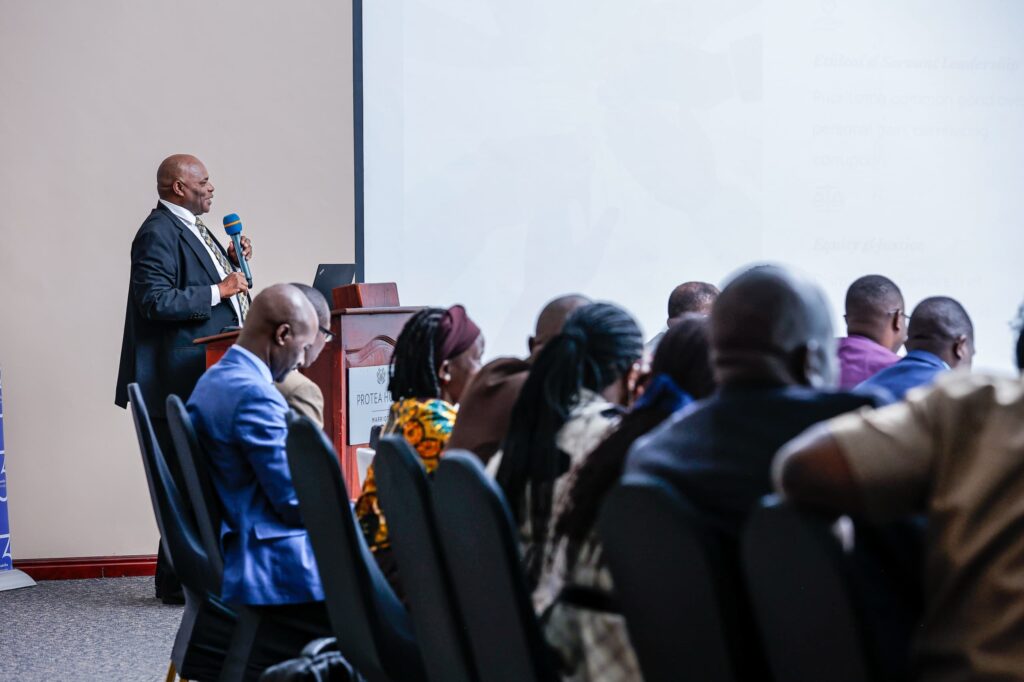Prof. Benon Basheka has called for a renewed focus on transformative governance, digital resilience, and inclusive policy frameworks as critical drivers for Africa’s socio-economic transformation in the digital age.
Speaking at the International Conference on Governance, Leadership, and Socioeconomic Transformation at Protea Hotel, Entebbe, Prof. Basheka delivered a thought-provoking presentation touching on space governance, digital policy, and Africa’s readiness to adapt to global innovation trends.
“In governance, there’s airspace, but beyond that, there is international airspace and outer space,” he noted. “Outer space is a human heritage that should benefit all. While countries with capacity are taking the lead, Africa must not be left behind.”
He referenced Africa’s continental space strategy, pointing out that although the African Union launched the initiative last year, implementation has been slow.
“The only aspect implemented so far was capacity-building, where 2,000 people were trained in secondary communication, navigation, and positioning. But the broader vision of a regulated African space sector remains largely unfulfilled,” he said.
Turning to domestic governance challenges, Prof. Basheka lamented the erosion of household stability and youth unemployment, which he attributed to weak governance systems. “Many African youth are no longer staying in their homes. The challenges are deep. Africa is in an empathy crisis as far as governance is concerned,” he stressed.
He advocated for governance that serves the common good, combats corruption, and promotes youth and women’s involvement in decision-making.
Drawing a distinction between public and private sector governance, Prof. Basheka explained, “Governance in the public sector has a different meaning. It involves managing common goods and public interest—issues not as central in private enterprise.”
He also addressed academic integrity in the digital era, warning against the uncritical use of artificial intelligence in research. “It is now easy to write a paper in seconds using software. But where is the humanization in research?” he challenged. “Governance in the digital age must redefine traditional structures, replacing outdated policies with inclusive, digitally-aware frameworks.”
Prof. Basheka emphasized the need for strong governance in digital transformation. “Even though potential is generated by computers, someone must make decisions. You can’t just rely on algorithms to rule in your favour,” he warned. “Countries are now creating new policies to govern digital services. Traditional models are no longer effective.”
He called for new models of governance that match today’s technological and social realities. “Successful governance today must redefine institutional modules and frameworks, including budget allocations. Universities, for example, face significant underfunding despite their vital role.”
He also lamented the stalled African family project under Law 263, citing it as another missed opportunity due to governance gaps. “There are opportunities Africa can exploit if we emphasize digital inclusion. From financial services to weather forecasting and smart farming, we can lift people out of ignorance and improve livelihoods,” he said.
Prof. Basheka emphasized the importance of building digital resilience through proper infrastructure and governance frameworks. “You need infrastructure, springboard centres, governance frameworks, and digital literacy schemes like TikTok awareness programs,” he noted.
He concluded by encouraging delegates to engage robustly during the various conference sessions. “Some papers will focus on service delivery data, others on technology and integration. The diversity of topics reflects the depth of this gathering.”
The two-day international conference is jointly hosted by Nkumba University (Uganda), Mzumbe University (Tanzania), and the University of Johannesburg (South Africa), bringing together scholars, policymakers, and practitioners to deliberate on critical issues shaping the future of governance and leadership in Africa.



















Discussion about this post